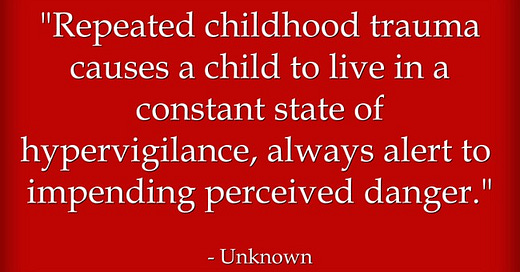When we think about discipline, many of us still hold onto outdated beliefs that hitting a child will teach them a lesson. We’ve all heard that age-old adage, “Spare the rod, spoil the child.” Like many mantras, repetition persuades people to believe something that is foolish or horrific. Consider how often slogans influence politics or how catchy tunes dominate the charts. Constantly repeating specific ideas numbs our critical thinking, resulting in a decline in current music quality or, in this case, effective parenting practices. If you are still hitting your kids you’re the equivalent to the mumble rappers of today. Add evidence that being spanked as a child correlates with a decrease in cognitive ability, and the repeated lies become perceived as truth. When everyone grows up hearing the same justifications for spanking, they start to believe them.
This is the start of our self-destructive programming.
A child who has experienced physical punishment will outwardly appear to be well-behaved, but the reality beneath the surface is troubling. That “acceptable” behavior comes from a place of fear and anxiety. When children are conditioned to suppress their true feelings and identities to evade pain, they aren’t learning respect or self-control; instead, they are acquiring the instinct to shut down emotionally, flee from their problems, or fight just to survive in an unforgiving environment. The truth is that fear fails to teach any significant lessons. Rather than encouraging growth and understanding, it instills a state of chronic stress, leading to a false sense of compliance that masks deeper emotional turmoil and unresolved issues.
When we label our children as “defiant” because they struggle with emotions, what do we do? We get more frustrated, and the punishment ramps up. We think a harder spanking or getting hit again will fix the tantrum. This response doesn’t build strength for anyone; it instills fear and confusion. Children aren’t equipped to manage their emotions the way adults are, and when they are met with violence instead of guidance, they learn to internalize those feelings. Their minds become fragmented, suppressing their genuine emotions of worry, insecurity, and despair so their nervous system can calm down and they can feel safe. This disconnection leads to a distorted sense of self that sticks with them into adulthood.
The effects of this emotional suppression are what drive the current confusion with identity issues, whether with gender or political ideology. A lack of self-worth takes center stage, and over time, this feeling manifests in serious issues: eating disorders, mental health struggles, and a pervasive sense of inferiority. As adults, these individuals grapple with the scars of their childhood. Wounds they do not even recognize that comes from the violence that was once normalized when they were young.
Hitting a child might get immediate compliance, but it creates a legacy of trauma. What we’re left with are adults who struggle with self-acceptance and fear of their own emotions. This cycle of violence doesn’t just end with the child; it follows us into our adult lives. Have you ever faced a challenge and couldn’t succeed, thought, what’s the point, or felt unworthy? That is the inner child you pushed deep down and hid, the one whose internal beliefs were forged by the hands of parents who praised their actions of physical torment against their child, all in the name of being well-behaved.
Time does not heal all wounds. We heal by raising awareness and a commitment to change. As fathers, we must do the work; we are responsible for guiding our children through understanding and not using fear as a tool for obedience. We need to create environments where emotions are welcomed, not suppressed. When we teach our kids that feeling, expressing, and processing their emotions is okay, we lay the groundwork for resilience and self-respect.
“Children don’t get traumatized because they are hurt. They get traumatized because they’re alone with the hurt.” – Dr. Gabor Mate
We must raise our children with compassion, patience, and consideration. This is not about being permissive or allowing them to run wild; it’s about establishing a firm foundation of trust. When children feel securely attached to their parents, they naturally turn to them for guidance, support, and a sense of who they are. That bond draws them toward their parents’ values and behaviors. But when fear, harsh discipline, or physical punishment come into play, that attachment starts to crack. Children shut down emotionally to protect themselves or look to their peers for the connection and validation they miss at home. That’s where things get disorganized, and outside forces take control. This peer pressure leads to kids being pulled more by their immature friends’ influence than by the grounding influence of their dad.
The goal of discipline should be to raise emotionally healthy, self-aware individuals. If we want to lead our children to become strong adults, we must show them true strength comes from understanding, empathy, and self-control, not fear. Let’s commit to breaking the cycle and raising a generation that knows their worth and values their emotional well-being.
It’s time to step up and be the fathers our children deserve.




